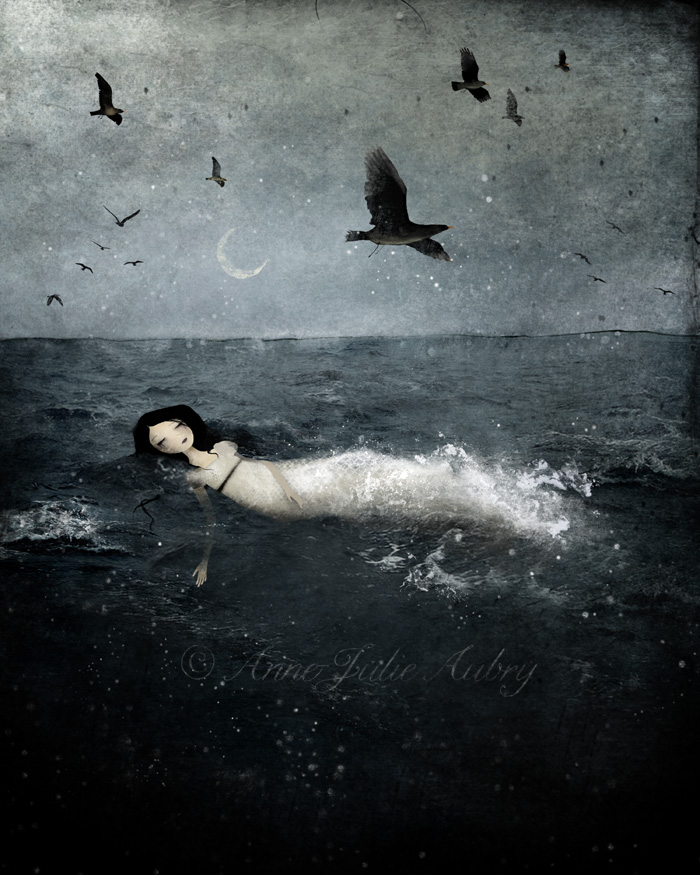To see my writing process for this essay click here. To read my blog posts for this essay click here. To view a pdf of this essay click here.
A Final Act of Rebellion: The Paradox of the Sea in Chopin’s The Awakening

Edna Pontellier of Kate Chopin’s The Awakening is a character of many complexities. There are a number of different ways to interpret one of the most puzzling parts of her story: her suicide. Throughout The Awakening she evolves from a woman who unquestionably follows the rules of family and society to a woman who rebels against and questions those same rules. The question becomes: why does she kill herself when it seems that she is happier than she has ever been? At first, the act seems contradictory and impulsive, but when looked at deeper, one can begin to see how Edna’s suicide is actually another act of rebellion against Victorian norms and ideals.
A key to her suicide is her relationship with the sea which demonstrates that Edna’s suicide is a liberating act. The sea is the place where she first is reborn into a new person, and it is the place where she ends her life. What seems to be a contradiction actually is not. The paradox of the sea in Chopin’s The Awakening showcases Mrs. Pontellier’s suicide as an act of rebellion, an expression of freedom, rather than a surrender to the oppressive ideals of her time, making the sea representative of rebirth and escape.
The first instance where the importance of the sea is made known is when Edna Pontellier swims far out into the ocean: “That night she was like the little tottering, stumbling, clutching child, who of a sudden realizes its powers, and walks for the first time alone, boldly and with over-confidence” (Chopin 49). This encounter occurs at night which is significant because it represents all the fear that is bottled up inside of Edna, fear of the unknown and of what will happen once she starts swimming. Night can also represent something that is hidden or shameful. Perhaps Edna feels afraid of wanting freedom when she is surrounded by women who do not, namely Adele Ratignolle and Madame Lebrun. Edna feels like a clutching child, meaning that she is still reliant on her husband and is not completely self-sufficient. A child is innocent, naïve, and follows authority blindly and without question. At this point in the story, Edna is not fully ready to take on a life of solitude, but this moment is the beginning of her realization that she deserves to feel more in control of her own life.
Because swimming alone in the sea is such a novel feeling and experience for Edna, she is uneasy. Her position of isolation at this moment is important because her thoughts are her own; no one is influencing her. These thoughts and feelings are genuine and organic. After her experience in the sea, Edna has an increased awareness of those restricting influences. Walking away from the beach alone, everyone “called to her and shouted to her. She waved a dissenting hand, and went on, paying no further heed to their renewed cries which sought to detain her” (50). Edna is now fully aware that the people in her life are hindering her potential to be the woman she truly wants to be. It is at this moment that she begins to reject and rebel against the norms of society.
This quote also foreshadows her suicide; she walks away from everyone she knows and their restricting ideals in order to become her true self, the version of herself that is not bogged down by social ideals. Edna realizes the sea is a place where she can become aware of her strength and power that she was unaware she possessed before. With this newfound strength, she takes that first step into freedom, feeling invincible and untouchable. She is reborn and is trying to learn how to live life again for the first time.

After Edna realizes her power and takes her first step in rebelling against oppression, she is able to connect to the sea. When she swims in the sea, “a feeling of exultation overtook her, as if some power of significant import had been given her to control the working of her body and her soul” (49). This feeling overtook her, meaning the feeling comes upon her unexpectedly, but once she allows herself to sit with the feeling, she gains control that she has never had in life before. Once again, there is mention of “power,” signifying that Edna now feels strength that she has not felt before. The mention of “soul” suggests that this encounter with the ocean goes much deeper than the physical body; Edna begins to connect with the ocean on a more spiritual level. She is finally in complete control instead of feeling that everyone else is in control of her, leaving her with no power over her own decisions and actions.
In addition, Edna “grew daring and reckless, overestimating her strength. She wanted to swim far out, where no woman had swum before” (49). Edna now has the ambition to do something unprecedented for a woman. This experience with the sea allows her to feel reckless and “intoxicated with her newly conquered power” (49). Edna has the desire to be someone different, someone better than who she is right now. Unfortunately, being a woman in the Victorian Era, Edna does not have much of a choice over who she is and what she can do. This experience is the first one in which she feels able to take some control back, but she will soon find out that she might never be able to be in control in this lifetime.
The sea is what cleanses her of the oppressive ideals of the time and allows her to see life in a different light. Using this experience with the sea, one can begin to understand how paradoxical the symbol is when compared with Edna’s final experience with the sea.
Edna’s first encounter with the sea is an uplifting one, one that births her into a new life. She also ends her life in the sea, which at first glance might seem contradictory, but her death is also a rebirth, an escape from the society that threatens to tear her down. Before she takes the final plunge, the narrator writes that “the voice of the sea is seductive, never ceasing, whispering, clamoring, murmuring, inviting the soul to wander in the abysses of solitude” (138). “Seductive” is an interesting word to describe the sea. Edna thinks of the sea as tempting or attractive, as something she possibly should not want.

This description can also be used when talking about Edna wanting freedom; it is something that she should not want, but it is attractive all the same. This description of the sea also reminds me of a beating heart, potentially suggesting that the sea is where Edna’s heart is, that when she dives in, she is returning to herself. The sea is inviting Edna’s soul, not her body, to swim. This is the second mention of the soul in relation to the ocean, once again giving Edna a deeper connection than just the physical body. She feels connected to the sea with her mind, body, and soul, a connection that she does not have in her real life.
“Abysses” gives the image of a bottomless pit, something that has no end. The ocean has no boundaries, unlike the world in which Edna lives. Edna can be free to be limitless and explore everything when she dives into the ocean, separated from the constraints of her everyday life. As Edna is taking her first steps into the sea, the text remarks that “the touch of the sea is sensuous, enfolding the body in its soft, close embrace” (138). Here, the sea is described similarly to a lover. The sea can give Edna what no other lover could give her: freedom; however, the sea can also keep Edna safe and warm by embracing her. She never has to worry about people trying to constrain her again. Edna has found the perfect place for herself, a place where she can truly be herself. By committing suicide, Edna takes the reins on her own life, takes back all the control that she had given up, and decides to be free.
Edna uses the sea as her setting for her final act of rebellion against the oppressive ideals that control her life. Before she dives into the sea, “for the first time in her life she stood naked in the open air, at the mercy of the sun, the breeze that beat upon her, and the waves that invited her” (138). As with the first experience Edna has with the sea, this experience is also a novel one. She stands in the open air naked as the day she was born. One can get the image of the wide expanse of the sea in front of Edna and how endless it looks to her.
One key difference between this encounter and the previous one is that this one happens during the day. Edna is unashamed of what she is about to do, and she does not care if anyone is watching. In this case, the sun could represent clarity, the start of a new day. Just as the sea is inviting, so are the waves, making Edna feel welcome and safe, unlike her husband. Edna feels “like some new-born creature, opening its eyes in a familiar world that it had never known” (138). As with the nighttime swim she took, there is an image of a newborn beginning to understand the world it lives in. The sea gives her the chance to become a new person who is in control of her life and her decisions. She leaves behind the problematic, familiar world she thought she knew and takes her life in her own hands.

Edna’s suicide is her final act of rebellion against all the people and ideals that threatened to overtake her. She realizes that she will either die unhappy in a life controlled by other people, or she will die happily in a death completely controlled by herself. The sea is representative of that chance of freedom for her.
The sea in Kate Chopin’s The Awakening is representative of rebirth and escape, making Edna’s suicide an act of rebellion against the traditional norms of her time rather than a surrender to them. She gains total control of her life and uses that control to end her life instead of letting oppression overtake her. The vast expanse of the sea allows Edna to see the world as a place without boundaries, and this only occurs when she is by herself and has realized her strength. The sea sets Edna free because of its depth and because she can be whoever she wants to be inside of that depth.
The first experience Edna has in the sea, that pure happiness she feels, allows her to understand how limiting her world is. Once she experiences the vastness of the sea, her world is never the same. The sea becomes seductive to her, and she cannot help but want to experience that feeling of freedom and escape again. What seems to be a contradictory place to end her life is actually quite fitting and appropriate. By ending her life in the sea, Edna frees herself from the binds of her life that never would have let her go otherwise.
Works Cited
Chopin, Kate. The Awakening. Edited by Nancy A. Walker, 2nd ed., Bedford/St. Martin’s, 2000.